
想象一下,你正在做一个有特别设想的项目。但每次动笔,实际效果都不理想。脑海中的完美想象跟当前付诸实施的能力之间存在差距。尝试的次数越多就越沮丧,直到把最后一张纸揉成一团扔进垃圾桶,怒冲冲一走了之彻底放弃。
是不是引起了些许共鸣?也许童年你就有过典型的追求优秀受挫的记忆。想想有多少次你沮丧地放弃,身后留下一堆纸团?
简单来说,这就是完美主义:相信你必须做到最好,否则就无法满意。做不到完美无瑕就没有意义,根本不值得做。令人不安的是,一旦设定如此难以实现的标准,就容易失去动力,不仅对自己的努力失去了信任,对自己也信心不再。问题不在于成功,实现目标或不断努力成为最好的自己。问题是将自我价值与成就联系在一起,所以会害怕犯错,害怕自己不是最优秀。翻译过来就是,我们可能会认为,如果不完美就毫无价值。
那么,如何确定自己是因完美主义而焦虑,还是因为目标太高精神崩溃?首先问问自己:压力和担忧是否与自我看法有关?认真审视自我暗示。有没有发现自己会想,“还有这么多事情要做!怎么才能搞定?”或者你会告诉自己,“我应该把这一切都处理好的。我太差劲了。我有什么毛病?”如果你关注重点是工作量,很清楚一个人的内在价值并不取决于工作是否完成,那么很可能只是过度紧张。但是,如果发展到自我批评,对工作感到羞愧或总觉得有不足,那就说明完美主义已达到不健康的程度。
完美主义并不一定会体现在生活的方方方面。一般来说,优秀人士更重视能帮自己提升认可的事,基本都是外在表现,包括外表、成就和人际关系等。例如,我有个非常勤奋的客户丽兹,她因为不按时看牙医长期牙疼,每月的美发预约却从未错过。
目标远大或想看起来更好并没有错。但现实是,虽然以前追求完美带来了一些成功,但各有代价。完美主义倾向没什么用了。你可能感到焦虑、负担过重、自我评价低,而且最近可能实现目标也越发困难。因为实际上完美主义会适得其反。当然,可能会有一些收获。但如果永远死死踩住油门,就无法健康成长,成为更好的自己。
完美主义的问题在于,既无法实现也不可持续,最终变成成功的障碍。“完美主义是一种狭隘的、不够包容的期望,不允许犯错误,也不许有任何不完美,”《CBT完美主义工作簿》作者莎伦·马丁写道。“只要犯一个错误,就判定自己彻底失败或低人一等……期望完美时,就不可避免会失望。无论人多么聪明多么努力,都会犯错。”要处理这么多利害关系,认为必须达到完美才能被视为团队不可缺的一员,才值得找到新工作,值得晋升,这些都是压力。面对无法达到的标准,注定会失败,因为再接近完美也无法实现完美。当现实与期望越不一致,痛苦就越明显。因此,无法实现的期望会导致长期焦虑和自我怀疑,阻碍进步和提升。
社会福利硕士、意见领袖布蕾妮·布朗博士在《不完美的礼物》(The Gifts of Imperfection)一书中提到,研究表明完美主义实际上会阻碍成功,还可能导致焦虑、抑郁和所谓“生活瘫痪”。后果就是 “因为太害怕把可能不完美的东西带到世界上而错过各种机会……所有没敢追寻的梦想,都是因为深怕失败、犯错和让别人失望”。一定要牢记一点,我们是人,是人就会犯错。这是事实。所以如果想继续前进实现目标,就必须重新调整期望承认现实。
这并不意味着必须甘于平庸,或者成日忧心忡忡离群索居。要追求欢乐!有一种方法可以避免陷入痛苦的泥潭,摆脱焦虑的自我伤害循环,抛弃注定失败的标准。解药是另一种衡量成功的标准:卓越。标准仍然很高,我们也喜欢这样!但这次充分考虑到了人性。

卓越等式
卓越的关键在于尊重自我,尊重自己的身心和精神,努力追求成功,而不是抱着非完美就算失败的心态。
每个人都是独一无二的,一天、一年或一生中以自己的方式展现卓越。为了统一理解,这里的定义就是我提出的“卓越等式”,简单概述了整体概念:
卓越=健康、快乐和优秀
快乐:情绪稳定,充满和平、自由和希望,体验和经历各种各样的感受,没有被否认、评判或永远沉浸其中的情绪。没有持续的焦虑、担忧、恐慌或抑郁。积极优化想法和行为,以减少痛苦促进健康。
健康:充足的睡眠和定期锻炼,良好的饮食习惯,有效地管理压力,不使用药物麻醉,合理就医照顾好身体。
超越自我:坚持追求有意义的目标,培养和维护牢固的人际关系,加入超越自身的伟大事业,继续学习和成长(不可停滞不前),感激已拥有的事物。不断前进,不断进步,坚持不懈地追求有意义的成就。
毕竟,如果长期感到焦虑和不满足,漠视身心健康,精力不用来做有意义的事情,生活像孤岛,感觉生活中没有值得感激的事,这样的生活真的美好吗?
创造美好的生活,意味着思想(快乐)、身体(健康)和精神(超越自我)是最高要义。(财富中文网)
摘自玛丽·E·安德森博士的《快乐的优秀人士:发挥优势且克服焦虑、管理压力和激励自我成功的8个要素》。
译者:夏林
想象一下,你正在做一个有特别设想的项目。但每次动笔,实际效果都不理想。脑海中的完美想象跟当前付诸实施的能力之间存在差距。尝试的次数越多就越沮丧,直到把最后一张纸揉成一团扔进垃圾桶,怒冲冲一走了之彻底放弃。
是不是引起了些许共鸣?也许童年你就有过典型的追求优秀受挫的记忆。想想有多少次你沮丧地放弃,身后留下一堆纸团?
简单来说,这就是完美主义:相信你必须做到最好,否则就无法满意。做不到完美无瑕就没有意义,根本不值得做。令人不安的是,一旦设定如此难以实现的标准,就容易失去动力,不仅对自己的努力失去了信任,对自己也信心不再。问题不在于成功,实现目标或不断努力成为最好的自己。问题是将自我价值与成就联系在一起,所以会害怕犯错,害怕自己不是最优秀。翻译过来就是,我们可能会认为,如果不完美就毫无价值。
那么,如何确定自己是因完美主义而焦虑,还是因为目标太高精神崩溃?首先问问自己:压力和担忧是否与自我看法有关?认真审视自我暗示。有没有发现自己会想,“还有这么多事情要做!怎么才能搞定?”或者你会告诉自己,“我应该把这一切都处理好的。我太差劲了。我有什么毛病?”如果你关注重点是工作量,很清楚一个人的内在价值并不取决于工作是否完成,那么很可能只是过度紧张。但是,如果发展到自我批评,对工作感到羞愧或总觉得有不足,那就说明完美主义已达到不健康的程度。
完美主义并不一定会体现在生活的方方方面。一般来说,优秀人士更重视能帮自己提升认可的事,基本都是外在表现,包括外表、成就和人际关系等。例如,我有个非常勤奋的客户丽兹,她因为不按时看牙医长期牙疼,每月的美发预约却从未错过。
目标远大或想看起来更好并没有错。但现实是,虽然以前追求完美带来了一些成功,但各有代价。完美主义倾向没什么用了。你可能感到焦虑、负担过重、自我评价低,而且最近可能实现目标也越发困难。因为实际上完美主义会适得其反。当然,可能会有一些收获。但如果永远死死踩住油门,就无法健康成长,成为更好的自己。
完美主义的问题在于,既无法实现也不可持续,最终变成成功的障碍。“完美主义是一种狭隘的、不够包容的期望,不允许犯错误,也不许有任何不完美,”《CBT完美主义工作簿》作者莎伦·马丁写道。“只要犯一个错误,就判定自己彻底失败或低人一等……期望完美时,就不可避免会失望。无论人多么聪明多么努力,都会犯错。”要处理这么多利害关系,认为必须达到完美才能被视为团队不可缺的一员,才值得找到新工作,值得晋升,这些都是压力。面对无法达到的标准,注定会失败,因为再接近完美也无法实现完美。当现实与期望越不一致,痛苦就越明显。因此,无法实现的期望会导致长期焦虑和自我怀疑,阻碍进步和提升。
社会福利硕士、意见领袖布蕾妮·布朗博士在《不完美的礼物》(The Gifts of Imperfection)一书中提到,研究表明完美主义实际上会阻碍成功,还可能导致焦虑、抑郁和所谓“生活瘫痪”。后果就是 “因为太害怕把可能不完美的东西带到世界上而错过各种机会……所有没敢追寻的梦想,都是因为深怕失败、犯错和让别人失望”。一定要牢记一点,我们是人,是人就会犯错。这是事实。所以如果想继续前进实现目标,就必须重新调整期望承认现实。
这并不意味着必须甘于平庸,或者成日忧心忡忡离群索居。要追求欢乐!有一种方法可以避免陷入痛苦的泥潭,摆脱焦虑的自我伤害循环,抛弃注定失败的标准。解药是另一种衡量成功的标准:卓越。标准仍然很高,我们也喜欢这样!但这次充分考虑到了人性。
卓越等式
卓越的关键在于尊重自我,尊重自己的身心和精神,努力追求成功,而不是抱着非完美就算失败的心态。
每个人都是独一无二的,一天、一年或一生中以自己的方式展现卓越。为了统一理解,这里的定义就是我提出的“卓越等式”,简单概述了整体概念:
卓越=健康、快乐和优秀
快乐:情绪稳定,充满和平、自由和希望,体验和经历各种各样的感受,没有被否认、评判或永远沉浸其中的情绪。没有持续的焦虑、担忧、恐慌或抑郁。积极优化想法和行为,以减少痛苦促进健康。
健康:充足的睡眠和定期锻炼,良好的饮食习惯,有效地管理压力,不使用药物麻醉,合理就医照顾好身体。
超越自我:坚持追求有意义的目标,培养和维护牢固的人际关系,加入超越自身的伟大事业,继续学习和成长(不可停滞不前),感激已拥有的事物。不断前进,不断进步,坚持不懈地追求有意义的成就。
毕竟,如果长期感到焦虑和不满足,漠视身心健康,精力不用来做有意义的事情,生活像孤岛,感觉生活中没有值得感激的事,这样的生活真的美好吗?
创造美好的生活,意味着思想(快乐)、身体(健康)和精神(超越自我)是最高要义。(财富中文网)
摘自玛丽·E·安德森博士的《快乐的优秀人士:发挥优势且克服焦虑、管理压力和激励自我成功的8个要素》。
译者:夏林
Imagine you’re working on a project for which you have a very particular vision. But every time you put pen to paper, your execution falls short of your ideal. There’s a gap between the perfect image in your mind and your ability to realize the concept in the moment. The more attempts you make, the more frustrated you become, until finally you crumple up one last sheet of paper, toss it in the trash, and storm away, giving up altogether.
Does that scenario resonate, either literally or figuratively? Perhaps you have memories of those kinds of classic anxious high-achieving frustrations even dating back to childhood. How many balled-up pieces of paper have you left in your wake while you walked away feeling defeated, like you failed?
This is perfectionism in a nutshell: the belief that everything you do has to be the very best or it’s not good enough. In fact, unless it’s flawless, it doesn’t even count and isn’t worth doing at all. What’s troubling is that, when we set such unattainable standards, we lose momentum and lose trust not only in our endeavors but also in ourselves. The problem is not the drive to succeed, achieve our goals, or continually become our best self. The problem is that we tie our self-worth to our achievements, so we become terrified to make mistakes or ever look less than the best. Translation: We may believe that if we’re not perfect, we’re worthless.
So how do you know if you’re plagued by anxiety-promoting perfectionism or are simply overwhelmed by too much on your plate? First, ask yourself: Is my stress and worry tied to how I think about myself? Shine your flashlight on your self-talk. Do you find yourself thinking, “I have so much to do! How will I get it all done?” Or are you telling yourself, “I should be able to handle all of this. I must really suck. What’s wrong with me?” If you’re primarily focused on the sheer volume of work, but you know your inherent value as a person is not contingent on whether you get it done, then you’re likely just overextended. But if you are barraging yourself with self-criticism and feeling shame or inadequacy about your work, that’s indicative of unhealthy perfectionism.
Perfectionism doesn’t always manifest in all areas of your life. Frequently, high achievers are consumed with the parts that win them the most potential approval and are external-facing—appearance, achievement, relationships. For example, I had one hardworking client, Liz, who had chronic toothaches because she didn’t prioritize going to the dentist on schedule, but she never missed her monthly hair appointment.
Now, there’s nothing wrong with lofty goals or wanting to look your best. But the reality is that while striving for flawlessness has brought you some success in the past, it has cost you something, too. Those perfectionist tendencies aren’t serving you anymore. You are probably feeling anxious, overburdened, and bad about yourself, and maybe you haven’t been hitting your marks as much as you want lately, either. Because perfectionism is actually counterproductive. You may achieve to a point, sure. But you won’t thrive and be the greatest version of yourself while you’re so afraid to let your foot off the gas.
The problem with perfectionism is that it’s unattainable and unsustainable, rendering it a hindrance to success. “Perfectionism is a narrow, intolerant expectation that we will never make mistakes or have any imperfections,” writes Sharon Martin, MSW, LCSW, author of The CBT Workbook for Perfectionism. “We take one mistake and use it to deem ourselves complete failures or inferior . . . When we expect perfection, we’ll inevitably be disappointed. We all make mistakes, no matter how smart we are or how hard we work.” It’s stressful to have so much at stake, to think that we have to deliver perfection in order to be seen as an indispensable part of a team, a worthy new hire, or deserving of that promotion. Unmeetable standards set us up for failure because even if we come close, flawlessness is not achievable. And the more discrepant our reality is from our expectations, the more distress we’ll feel. So, unachievable expectations can cause such chronic anxiety and self-doubt that they stymie our progress and ascent.
In her book The Gifts of Imperfection, thought leader Brené Brown, PhD, MSW, references how research shows that perfectionism actually hampers success and can lead to anxiety, depression, and what she calls “life-paralysis.” That’s the fallout from “all of the opportunities we miss because we’re too afraid to put anything out in the world that could be imperfect . . . all of the dreams that we don’t follow because of our deep fear of failing, making mistakes, and disappointing others.”2 It’s crucial to remember that, because we are human, we will make mis- takes. That’s a fact. That’s why we have to recalibrate our expectations to acknowledge reality if we want to keep moving forward to achieve our goals.
This doesn’t mean that we must settle either for mediocrity or for an insular life of perpetual worry. Fun times! There’s another way to keep ourselves from getting mired in pursuit of this albatross, to escape the self-sabotaging cycle of anxiety and standards by which we are doomed to fail. The antidote comes in the form of a different metric for success: excellence. The bar is still extraordinarily high—where we like it!—but this time it allows for our humanity.
The excellence equation
Excellence hinges on honoring yourself, mind, body, and spirit, holding space for a range of what success looks like rather than some perfect-or-bust mindset.
Each person is unique and will manifest excellence in their own way, within a day, a year, or a lifetime. So that we have a shared understanding, the working definition we’ll use is what I call the “Excellence Equation,” which outlines the overall concept in simple terms:
Excellence = healthy, happy, and high-achieving
Happy: Stable mood, a sense of peace and freedom, hope, experiencing and moving through a full range of feelings, no emotion being denied, judged, or perpetually stuck in. Definitely not continual anxiety, worry, panic, or depression. Actively optimizing your thoughts and behaviors to reduce distress and promote wellbeing.
Healthy: Getting ample sleep and regular physical activity, eating well, effectively managing stress, not using substances to numb out, taking care of yourself by attending appropriate medical visits.
High-achieving: Sustainably striving for meaningful goals, cultivating and maintaining strong relationships, being a part of something bigger than yourself, and continuing to learn and grow (not settling for stagnation) while also appreciating what you already have. Moving forward, making progress, and persevering in the pursuit of purposeful accomplishments.
After all, would it really be an excellent life if you were walking around feeling chronically anxious and unfulfilled, disregarding your mental and physical wellbeing, not using your energy to accomplish anything meaningful, living in isolation, and thinking you didn’t have anything to be grateful for?
Creating an excellent life means making your mind (happy), body (healthy), and spirit (high-achieving) of paramount importance.
Excerpted from THE HAPPY HIGH ACHIEVER: 8 Essentials to Overcome Anxiety, Manage Stress, and Energize Yourself for Success―Without Losing Your Edge by Mary E. Anderson, PhD. Copyright © 2024 by the author. Reprinted with permission of Balance, an imprint of Grand Central Publishing.






